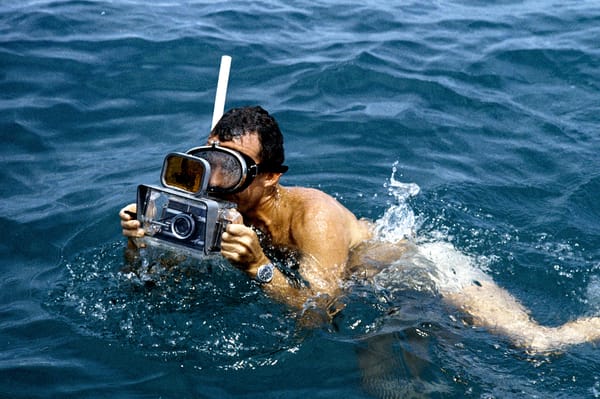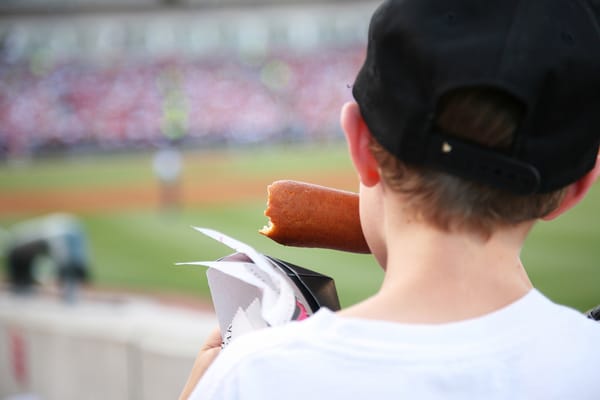INDIGNITY VOL. 3, NO. 44: Basketball replay is out of bounds.
ANDY ROONEY 2.0 DEP'T.

Calling Foul on Video Review
I DON'T PAY attention to college basketball the way I used to, ever since the University of Maryland quit the Atlantic Coast Conference, the best basketball conference in the country, to go try to be a football school in the Big 10. Now there are 14 schools in the Big 10 and Syracuse, a definitive Big East program, is playing down on Tobacco Road in the similarly overexpanded ACC, and I just tune in for the NCAA tournament, really.
Both times I really got interested in a basketball game in the first round of the NCAA tournament, though, the game got interrupted by the referees. Once it was with Maryland playing West Virginia; then it was in 16th-seeded Fairleigh Dickinson's upset of No. 1 seed Purdue. It was the same thing in both cases: late in the game, with the action heating up, they halted everything to review which team should have possession of the ball.
The back-and-forth rhythm of a close contest stopped, to be replaced by long, dragging minutes of the officials peering at a video monitor. The TV broadcast team joined in by running their own replays over and over, from every angle, with extended commentary.
Yet it wasn't exactly commentary on what they were seeing. It was partly commentary on what they were seeing, and partly a stilted effort to talk around what they weren't allowed to see. What had happened each time was that a player on the offensive team had tried to do something with the ball, a defender had hit them on the arm, and the ball had gone out of bounds.
The referees were staring at the video to try to determine who was the last player to have touched the ball before it went out. Under the rules, the last person the ball was in contact with—slipping from a fingertip, grazing a shoulder, brushing a lock of hair—is responsible for it, and the other team gets the ball.
Except also under the rules, you're not allowed to hit someone to knock the ball loose! No "striking in any way the person of an opponent" was No. 5 of James Naismith's 13 original rules of the game, and it has been in effect ever since. (Naismith's original out-of-bounds rule, giving the ball to whoever chased it down and touched it first, was abandoned early on as a disaster.)
According to the 21st century replay standards, though, the refs aren't able to watch the video, see the part where the person gets hit, and retroactively call a foul. They're only allowed to judge the part about who touched it. If the ball flies out of the hand of the person who got hit, and no one else makes contact with it, then the person who got hit loses possession. Because someone hit them.
Before replay, referees could handle these specific out-of-bounds calls with discretion. Yes, technically, hitting the arm is a foul. But basketball players bump into each other all the time. Officially calling a foul is a big thing, especially late in a close game. So instead the refs would overlook the details: declare that the defensive player who slapped the arm had touched the ball last, award the ball back to the offense, and let the action pick up right where it left off.
If it wasn't exactly the truth, it was accurate in spirit, and better than the alternatives. It was definitely preferable to sitting around waiting for the refs to send the ball the other way, rewarding a bad defensive play.
In the Maryland–West Virginia game, the refs seemed to eventually talk themselves into going back to the old system. Most of the replays made it look like the ball had gone out off the hand of the Maryland player who got hit, but it was close enough that the refs could call it inconclusive and let his team keep the ball.
In the Fairleigh Dickinson–Purdue game, though—with the 16 seed, the shortest team in the country, trying to finish off its giant-killing upset—there was no way to fudge the video. An FDU player knifed through four Purdue players and grabbed an offensive rebound by the baseline, one of the beaten defenders swiped at him late and hit him on the elbow, and the ball popped out of his hands. Because no one on Purdue was even in good enough position to have touched the ball, Fairleigh Dickinson had to surrender possession.
Replay review in sports is always a bad thing, aesthetically and philosophically. It doesn't just break the flow of the action, it displaces the entire experience of the game out of real time, forcing the players and spectators to wait for an authority figure to tell them what they've just done or just seen. The review process substitutes fake precision and convoluted legalisms for firsthand observation; it turns things too quick or minute for the human eye to catch into decisive and dispositive evidence. It's made the NFL unwatchable.
Even if you still want to believe in replay—if you think strict rulebook versions of fairness and accuracy are worth sacrificing the live game for—the basketball situation is indefensible. Under what theory of fairness does it make sense to pedantically enforce only half of the relevant rules, while leaving the other half of the rules suspended?
But that's what we get now, in sports and in life in general—narrow, technologized verdicts, generated by applying rigid rules to incomplete information. For the supposed benefit of stamping out human error, we've embraced mechanistic wrongness. The rulebook says to look at the video monitor; the video monitor says the last hand on the ball belonged to this particular person; every other question of cause and effect, let alone of justice, is off limits. Garbage in, certifiably reviewed garbage out.


WEATHER REVIEWS
New York City, March 23, 2023
★★ Rain kept churning toward the city on the radar but breaking up as it got near. The clouds let through some brightness in the east and started fraying, till the twigs and branches of the trees became a netting of gold-tinged silver and full broad daylight spread over the morning. The second round of forecast rain, though, held together, covering the late morning and pattering into lunchtime. Behind that, the third wave of rain was another no-show, leaving the afternoon puddly but tolerable. Soggy gloves lay in the streets. There was nothing attractive about the light; the emerging flowers couldn't enliven the dullness all around. Canada geese pecked at the slope above the demolished pathway behind the baseball backstop. The eye was drawn to litter: a cornflakes carton on the ground, a mylar popcorn bag in a bush, a squeezed-out half-lemon lying filthy in the gutter.

EASY LISTENING DEP’T.
The Indignity Morning Podcast is also available via the Apple and Spotify platforms.

SANDWICH DEP’T.
WE PRESENT INSTRUCTIONS for the assembly of select sandwiches from Club House Cook Book: Favorite Recipes Collected by The Tuesday Club House Association, published in 1904, found in the public domain and available at archive.org for the delectation of all.
EGG SANDWICHES.
Boil eggs and remove yolks; into these rub salt, pepper, lemon juice and grated onion to taste; add finely chopped whites and spread between slices of wheat bread.
NUT SANDWICHES.
Mix finely chopped English walnuts or peanuts with mayonnaise dressing and spread on thin slices of bread that has been buttered on both sides.
If you decide to prepare and attempt to enjoy a sandwich inspired by these offerings, kindly send a picture to us at indignity@indignity.net.

Thanks for reading INDIGNITY, a general-interest publication for a discerning and self-selected audience. We depend on your support!






